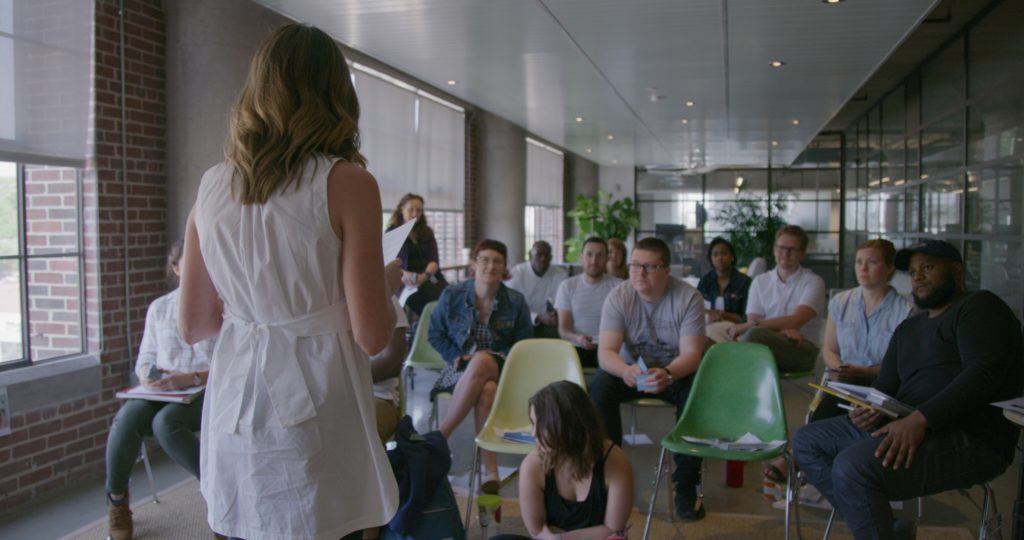
Fostering Philanthropy at Work
Fostering Philanthropy at Work
A partnership between MailChimp and the Community Foundation for Greater Atlanta offers employees an intensive course in corporate citizenship, and is helping shape a new generation of philanthropists to address the city's inequality.
Lots of corporations give back to the communities they serve, but at what point does that giving transform from stroking a check to becoming part of the corporate DNA? And how do companies empower not just those with the biggest salaries, but the “regular folks”, rank and file employees, to understand how they can make a difference in their own corner of the world?
Enter Atlanta-based MailChimp, the world’s largest marketing and email automation platform and Inc. magazine’s firm of the year, who set out on a journey to help its future leaders understand the role of philanthropy in achieving greater equity in community. Since its inception the company has valued giving back, but company leadership wanted to go deeper. They wanted to confirm for each employee that they can be philanthropists today and make a difference, independently and collectively, to improve the city in which they live and work.
Distressed by Atlanta’s ranking as the city with the highest income inequity in the United States, MailChimp believed there was not just an opportunity, but an obligation, to help. And they knew that the first step was to better understand their community, starting with those on the company’s front line. With offices located in a former Sears warehouse near downtown Atlanta and adjacent to the Atlanta BeltLine, a growing network of paths and parks, many MailChimp employees live within a few miles and commute to work on foot or by bicycle, often passing through distressed neighborhoods as well as newly-gentrified areas. They see the vast contrast in equity on a daily basis.
Distressed by Atlanta’s ranking as the city with the highest income inequity in the nation, MailChimp believed there was not just an opportunity, but an obligation, to help.
Lain Shakespeare, MailChimp’s director of corporate citizenship, was charged to develop an experience to educate his colleagues on the issues and engage them in the solutions. The company had already launched a successful MailChimp University, an MBA-style leadership development program in partnership with Emory University’s Goizueta Business School. This would serve as the template for the community-focused program.
False Starts
Shakespeare approached me and my colleagues at the Community Foundation for Greater Atlanta about partnering on this employee education effort. Ironically, in the first conversation I had with Lain, we began with defining the word “equity,” which for forward-looking tech companies like MailChimp usually denotes an ownership position and stake in the company’s success. But Lain was clear: the “equity” he spoke of, drawn from his experiences and background in Atlanta’s community and nonprofit arena, stood squarely at the intersection of justice and equality. Same word. Very different meanings. Thus, a creative dialogue began.
I wasn’t convinced that the Community Foundation was the right partner for this work. I at first limited the potential of this relationship to more run-of-the-mill forms of corporate giving: (lots of) chicken dinners; corps of well-meaning volunteers; sponsorships and big bold banners. So, twice I suggested to Lain that another nonprofit, more focused on the corporate sector, would be a better partner. But Lain had prior experience with the Foundation and in the community and he knew what he wanted. He went away, and when he returned he used these magic words… “that this was an opportunity to grow the next generation of Atlanta’s philanthropists.” I was hooked.
Thus, an innovative partnership between MailChimp and the Community Foundation for Greater Atlanta began. Its centerpiece is “MailChimp Community College,” a 15-week experience for the company’s employees. The curriculum was developed by the foundation which, over its 66 years, has built relationships with most of the region’s 4,000 nonprofits. Our 30,000-foot blue sky perspective, coupled with our on-the-ground grassroots connections, equipped us to create a robust and exciting syllabus featuring more than 40 local civic leaders, nonprofit executives and community organizers representing this diverse and dynamic region.

At MailChimp Community College, the initial cohort of employees learns about critical challenges related to poverty and inequality across Atlanta as well as solutions to promote greater economic equity. Credit: Community Foundation for Greater Atlanta.
As the foundation’s longtime CEO, Alicia Philipp, expressed, “In my time in Atlanta, no other company has taken their employees on such a deep journey into community knowledge and philanthropy. It was a phenomenal opportunity to see Community College ignite a fire in these budding philanthropists, who now understand terms like income inequity and community impact.”
Fostering Philanthropy from Within
Dozens of MailChimp employees applied to be part of the initial cohort of 12 participants. Over eight half-day sessions, this small group, representing diverse backgrounds and company roles, learned about public education, transportation, the arts, homelessness, criminal justice, affordable housing and more, engaging in authentic discussions about their community’s assets and challenges. In addition to learning in a classroom setting, Community College participants amplified their learning via homework and site visits to nonprofits to enable them to see the work first hand.
Perhaps most exciting, MailChimp provided employees with an opportunity to experience the joy of philanthropic choice. The company put its money where its mouth is by empowering participants to award a collective $200,000 from the company’s philanthropic budget to worthy nonprofits. Additionally, each participant was provided $2,500 to award to a nonprofit of their choice.
To prepare for this opportunity, the curriculum also included the ins-and-outs of what to look for when evaluating and investing in a nonprofit. The Community Foundation shared the rigorous and thorough process we go through when awarding competitive grants, and the MailChimp cohort took their assignment very seriously. As they heard from various community leaders, learned the critical issues around equity in our city, and heard from and visited specific nonprofits working tirelessly around the issues, they began to narrow their focus to a few key nonprofits for grant consideration.
Then, the Community Foundation brought in another partner, the Center for Civic Innovation, to provide ‘pitch training’ for the nonprofits and prepare a session where Community College participants would hear from the finalists and make decisions on grants.

In the end, a total of 13 nonprofits were invited to apply for grants, and each received a minimum of $2,500. The cohort awarded significant grants to three nonprofits: Partnership for Southern Equity ($16,250), Raising Expectations ($28,750) and the Georgia Justice Project ($100,000). The rigor of this philanthropic journey provided MailChimp employees with classic knowledge and deliberation skills for grantmaking. The diverse exposure to the community emboldened and empowered them through unprecedented and honest exchange. The creativity and authenticity of the MailChimp team made it unique and “weird”– a reflection of the company’s culture that strives to nurture an equitable and empathetic workplace and an empowered and inspired community.
“We’re raising up the next generation of philanthropists because it’s in the MailChimp DNA to help our future leaders be the best they can be — not only for MailChimp, but for the planet where we live, work, learn and play,” said Lain Shakespeare. “We never could have accomplished such a mammoth task without the Community Foundation, and we are thrilled about the future ahead.”
We’re thrilled, too. Lain’s persistence helped me, and in turn our entire organization, understand that we could indeed play a role in helping a corporate entity foster philanthropy from within. Our day-to-day work is focused on connecting individual donors and donor families with the causes and programs that help us bridge the inequity gap in our region. And in a sense, that’s what we’ve done with MailChimp: we’ve created 12 new philanthropists who can become ambassadors to this important mission in the city they call home.
Lesley Grady is senior vice president for community at the Community Foundation for Greater Atlanta.


